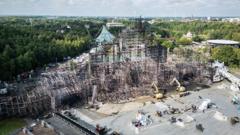On March 21, 2025, Heathrow Airport's operations were severely disrupted due to a fire at an electrical substation, which resulted in the cancellation or diversion of more than 1,000 flights, highlighting concerns over the airport’s infrastructure resilience.
Heathrow Airport Reopens After Major Fire Disruption

Heathrow Airport Reopens After Major Fire Disruption
A significant electrical substation fire at Heathrow Airport prompts over 1,000 flight cancellations, sparking an urgent investigation.
Heathrow Airport in London faced immense turmoil on Friday when a fire broke out at an electrical substation, leading to an unprecedented disruption at one of Europe's busiest air travel hubs. The incident forced the cancellation or diversion of more than 1,000 flights, significantly affecting both domestic and international travel and leaving thousands of passengers stranded.
Thomas Woldbye, the airport's chief executive, referred to the incident as “unprecedented,” explaining that the airport suffered a power loss that could be equated to that of a midsized city. While backup systems were activated, they were insufficient to sustain the entire operational demands of the facility. Woldbye expressed optimism that normal operations would resume by Saturday.
British authorities stated that counterterrorism police would lead the ongoing investigation into the cause of the blaze, which occurred at the North Hyde substation, located northeast of the airport. However, the Metropolitan Police clarified later that they are not considering the incident suspicious based on preliminary assessments.
While the exact financial repercussions of the outage remain unclear, the fire has raised significant concerns regarding the airport's dependency on a single electrical substation for its power needs. This has prompted discussions about infrastructure vulnerability and the urgent need to enhance reliability to prevent future incidents.
As the situation continues to unfold, Heathrow is expected to manage efforts to rebook affected travelers and restore its vital role in global air travel.
Thomas Woldbye, the airport's chief executive, referred to the incident as “unprecedented,” explaining that the airport suffered a power loss that could be equated to that of a midsized city. While backup systems were activated, they were insufficient to sustain the entire operational demands of the facility. Woldbye expressed optimism that normal operations would resume by Saturday.
British authorities stated that counterterrorism police would lead the ongoing investigation into the cause of the blaze, which occurred at the North Hyde substation, located northeast of the airport. However, the Metropolitan Police clarified later that they are not considering the incident suspicious based on preliminary assessments.
While the exact financial repercussions of the outage remain unclear, the fire has raised significant concerns regarding the airport's dependency on a single electrical substation for its power needs. This has prompted discussions about infrastructure vulnerability and the urgent need to enhance reliability to prevent future incidents.
As the situation continues to unfold, Heathrow is expected to manage efforts to rebook affected travelers and restore its vital role in global air travel.





















